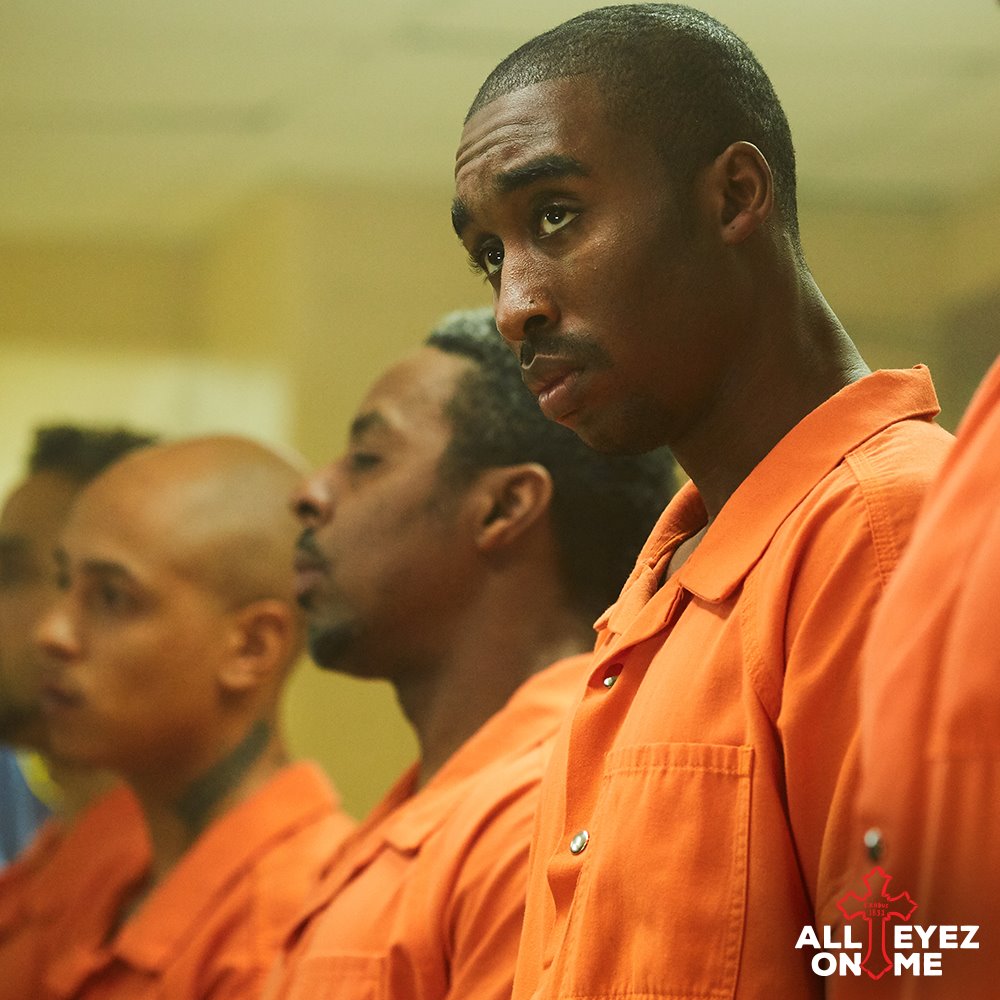For fans of Tupac Shakur—or fans of movies in general—the biopic All Eyez On Me can only be described as a massive letdown. The writing was corny, often reducing the complex and at times contradictory rapper to a Disney-like cliche e.g. the scene where he tells Biggie “We got a big platform. Use that platform to make change.”
But there are plenty of reviews that sum up the failings of this movie far better than I can—it currently has a Rotten Tomatoes score of 24 percent.
Videos by VICE
Instead I want to zero in on the film’s handling of one particularly controversial aspect of Shakur’s story, the sexual abuse conviction that landed him a sentence of one-and-a-half to four-and-a-half years in jail (he served eight months). In real life, according to both Shakur and the victim, Ayanna Jackson, she consensually performed oral sex on him at a club in November 1993. Four days later, on November 18, 1993, Jackson said she went to a hotel room where Shakur and three other men raped her. Shakur denied this; he was eventually convicted for groping Jackson but was acquitted of sodomy.
According to a New York Times article published at the time, Jackson said, “He should not be allowed to use his so-called celebrity status to avoid the consequences of his actions.”

We’ll probably never know exactly how things played out in that hotel room, but Shakur was convicted a very serious crime, one that men—especially men in positions of power—often get away with. With all that’s been said about the pervasiveness of rape culture, you would think that some sensitivity would be evident in how All Eyez On Me tackled this storyline. But no. What viewers see is a thirsty fangirl given the pseudonym Briana who grinds on Shakur in a nightclub and unzips his pants, ostensibly to give him head, while R. Kelly plays in the background. Later, according to Shakur, she basically stalks him with phone calls, but he has no interest in responding. Eventually, we get to the hotel scene. Shakur is in the room with a couple of his friends. He’s stressed out and Briana offers to give him a massage, but after she rubs him down for a bit, he gets up and leaves the room to pass out elsewhere. Cut to her bursting into a room where he’s sleeping, shrieking that she’s been attacked by his friends. In court in All Eyez On Me, Briana, who is previously seen only scantily clad, is dressed in a comically modest outfit, complete with thick-rimmed glasses. It looks like she’s trying to be a sexy librarian for Halloween and people in the audience I was in actually laughed. When Shakur is convicted, Briana smirks, as if gloating. The subtext is clear: she’s a gold-digging liar and Shakur is innocent.
Shakur’s story took place in the 90s, when blatant victim blaming in a would-be blockbuster movie might have gone unnoticed but today there’s really no excuse for it. Just this weekend, Bill Cosby, accused of sexually assaulting 60 women, walked out of court “free” after a judge declared a mistrial because of a hung jury. Rather than show any smidge of humility or shame, Cosby’s camp, including his spokesman and his wife Camille, released statements attacking the judge, prosecutors, and media, for colluding to ruin Cosby’s life.
“Mr. Cosby’s power is back. It’s back,” said his spokesman Andrew Wyatt. The fact that it’s unlikely Cosby will ever face justice makes me wonder where his power ever went.
Likewise, other celebrities including R. Kelly, Woody Allen, Casey Affleck, Roman Polanski, even President Donald Trump have never formally had to answer to the accusations of sexual assault launched against them. Typically, when women come forward in these cases, they are written off as being motivated by fame or money. (Complainants in less high-profile cases don’t fare any better.) This, in spite of the fact that false rape accusations are extremely rare.
While I can understand the impulse to gloss over the less flattering aspects of Shakur’s life for a general audience, a heavy topic like sexual assault deserves to be portrayed with nuance and respect. The failure to do so only perpetuates a culture in which victims and survivors are already treated so poorly.
Follow Manisha Krishnan on Twitter.




